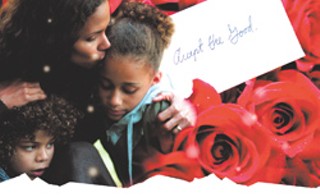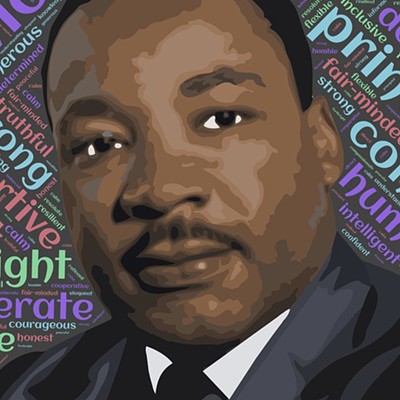Things We Lost in the Fire ***
Hot from helming last year’s After the Wedding (an Oscar nominee for Best Foreign-Language Film), Danish director Susanne Bier returns with her first film in the English language. But if there was any worry that Bier was “going Hollywood,” this somber and mature drama immediately quells that notion. Bier’s steady hand behind the camera is enough to overcome the flaws in Allan Loeb’s script, which relates the story of a pair of adults whose lives have been altered by a personal tragedy. Audrey Burke (Halle Berry) has just lost her sweet-natured husband Brian (David Duchovny, seen in extensive flashbacks) in a shooting, while Brian’s best friend Jerry Sunborne (Benicio Del Toro) has long blown a promising career as a lawyer due to the allure of hard drugs. Audrey has always disliked Jerry, but for various vague reasons -- perhaps to cope with her loneliness, perhaps as a gesture toward her late husband -- she invites him to move into the family’s garage. In his new (and nicer) surroundings, Jerry does his best to stay clean, filling up much of his time by bonding with Audrey’s two children (Alexis Llewellyn and Micah Berry). But his presence only seems to rankle Audrey, who remains unable to deal with the death of her husband. Bier, one of the disciples of the Dogme 95 style of moviemaking (basically, a Danish movement that insists on no employment of movie artifice like special effects and soundtracks and maximum use of natural light, hand-held cameras, etc.), has retained some of her European filmmaking instincts to cut down on the melodrama inherent in Loeb’s screenplay. She doesn’t always succeed but for the most part, she keeps the excess in check, which in turn leads to scenes that are even more powerful thanks to their subtlety. Berry does fine work in a rather difficult role, yet it’s Del Toro’s staggering performance that will have tongues wagging throughout award season. Del Toro’s face can be a map of emotions, and he’s allowed to unfold it freely as Jerry, a decent man who tries to keep smiling even through all the heartbreak.
The Assassination of Jesse James by the Coward Robert Ford ***1/2
While it’s unlikely to make any sort of dent at the box office, The Assassination of Jesse James By the Coward Robert Ford is no turkey; on the contrary, it’s a sterling example of accomplished filmmaking on a grand scale, wielding a lengthy running time that allows it to explore its themes and characters in satisfying detail. Adapted from Ron Hansen’s novel by writer-director Andrew Dominik, the story focuses on the tail end of Jesse James’ (Brad Pitt) run as a notorious outlaw. Planning one last heist, he and his brother Frank (Sam Shepard) enlist the aid of a motley crew, given that all of their regular cohorts in crime are either dead or in prison. Among the newcomers is Robert Ford (Casey Affleck), a 19-year-old kid who grew up idolizing the Jesse James found in dime-store novels. Robert initially follows Jesse around like a groupie -- or a stalker -- finally leading the bandit to ask, “Do you want to be like me, or do you want to be me?” Robert, a diminutive punk who’s been teased his entire life, hopes to prove himself a real man -- as much to Jesse and his gang as to himself -- but he finds that goal difficult to accomplish. And as he spends more time with Jesse, he realizes that the notorious gunslinger is less an antihero who marches to his own tune than a paranoid, vicious man who’s not above beating up teenage boys or shooting someone in the back. Aided by stunning cinematography by the excellent lensman Roger Deakins (Fargo, A Beautiful Mind) and a music score by Nick Cave and Warren Ellis that grows in stature as the film progresses, The Assassination of Jesse James also benefits from Hugh Ross’ sturdy narration, which adds depth to a movie already awash in it. Pitt is generous in his capacities both as an actor and one of the film’s producers, making his mark via a skillfully etched portrayal but also allowing a strong supporting cast to share in the spotlight (Sam Rockwell, Jeremy Renner and N.C. School of the Arts grad Paul Schneider are all noteworthy as members of Jesse’s gang). Yet top honors go to Casey Affleck, who’s as impressive here as he is in Gone Baby Gone.
Across the Universe ***1/2
What to make of Across the Universe, an ambitious musical that fashions a story around a catalogue of classic Beatles tunes? For my money, Across the Universe isn’t simply a good movie; it’s one of the best films of the year. One can nitpick about the thin plot, though it’s sturdy enough to function as a support beam to director Julie Taymor’s outlandish ideas. Taking place in the late 1960s, the story, credited to Taymor and the team of Dick Clement and Ian La Frenais (the blokes responsible for the smashing Irish R&B flick The Commitments), finds Liverpool laborer Jude (Jim Sturgess) traveling to America, whereupon he finds a best friend in college kid Max (Joe Anderson) and a lover in Max’s kid sister Lucy (Evan Rachel Wood). Eventually, the three end up in New York, at which point Jude develops his passion for drawing, Max gets drafted into the army, and Lucy finds her political consciousness awakened. The kids experience good times (a cross-country bus trip, chaperoned by Bono’s Dr. Robert) and bad times (riots aplenty), yet through it all, they realize that “all you need is love,” and that anything is possible “with a little help from my friends.” Combining the song sampling technique of Moulin Rouge with Forrest Gump’s journey through the turbulent 60s (and owing reams to Hair as well), Across the Universe dramatizes the past while also serving notice to the present (the Vietnam War material can’t help but stir images of Iraq).
The Darjeeling Limited **1/2
Wes Anderson’s most wispish work to date, a road movie in which the road is made of railroad tracks. Carrying over the thematic baggage of most of his previous efforts, this one also concerns itself with familiar discord -- here, Francis (Owen Wilson) invites his younger brothers Peter (Adrien Brody) and Jack (Jason Schwartzman) to India to join him on a spiritual quest. They travel mainly aboard the train The Darjeeling Limited, attempting to communicate (but often just miscommunicating) with each other as they reflect on their relationships with loved ones as well as with each other. Anderson regular Bill Murray pops up at the very beginning, and his shaggy-dog appearance sets the tone for the remainder of the picture. Working from a script he co-wrote with Schwartzman and Roman Coppola, Anderson places the bros in various situations that, despite all the lip service given to spiritual journeys and moments of epiphany, never markedly change them.
Dan in Real Life **1/2
You’ll laugh! You’ll cry! You’ll sing! You’ll reflect! The trailer doesn’t lie: Dan In Real Life wants to offer it all -- a fine sentiment when a movie can pull it off, an example of trying too hard when it doesn’t. Dan In Real Life falls somewhere in the middle: There are individual scenes that work nicely, even if the finished product doesn’t produce the flood of emotions one might have reasonably expected. Writer-director Peter Hedges, whose past scripts (including About a Boy and Pieces of April) were far more fine-tuned to the give-and-take dynamics of testy relationships between people, soft-pedals this material, offering a warm and fuzzy tale of a popular newspaper writer (Steve Carell) whose column, “Dan In Real Life,” offers practical advice that he can’t seem to apply to his own life. A widower with three daughters, Dan travels to Rhode Island for the annual family get-together with his parents (Dianne Wiest and John Mahoney), his siblings and their significant others. He falls for Marie (Juliette Binoche), a Frenchwoman he meets in a book store, only to be devastated when he learns that she’s the present girlfriend of his brother Mitch (Dane Cook). As Marie tries to sort out her feelings and Dan suffers in silence, the other family members parade through the story offering their own nuggets of advice to the downtrodden columnist. It’s nice to see this normal a family on screen, but the movie pays a price for its politeness, since there’s never any sense that feelings might be hurt or egos bruise.


























